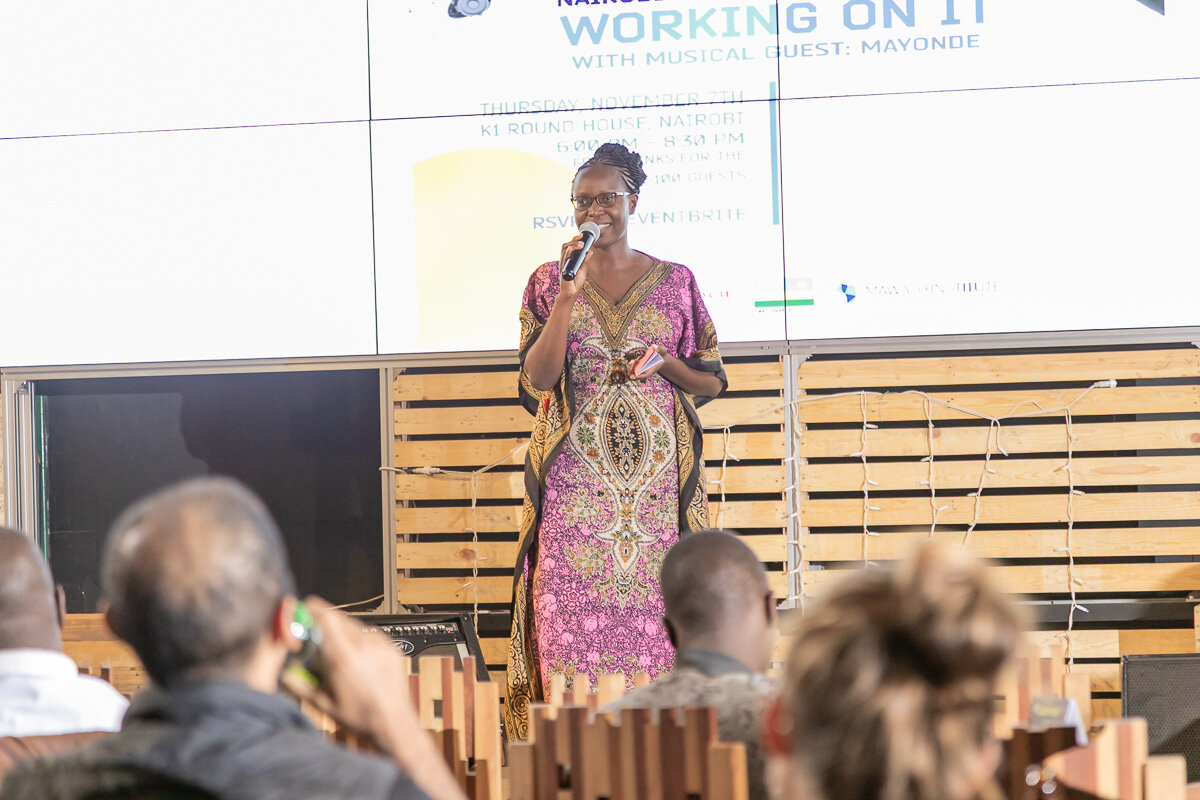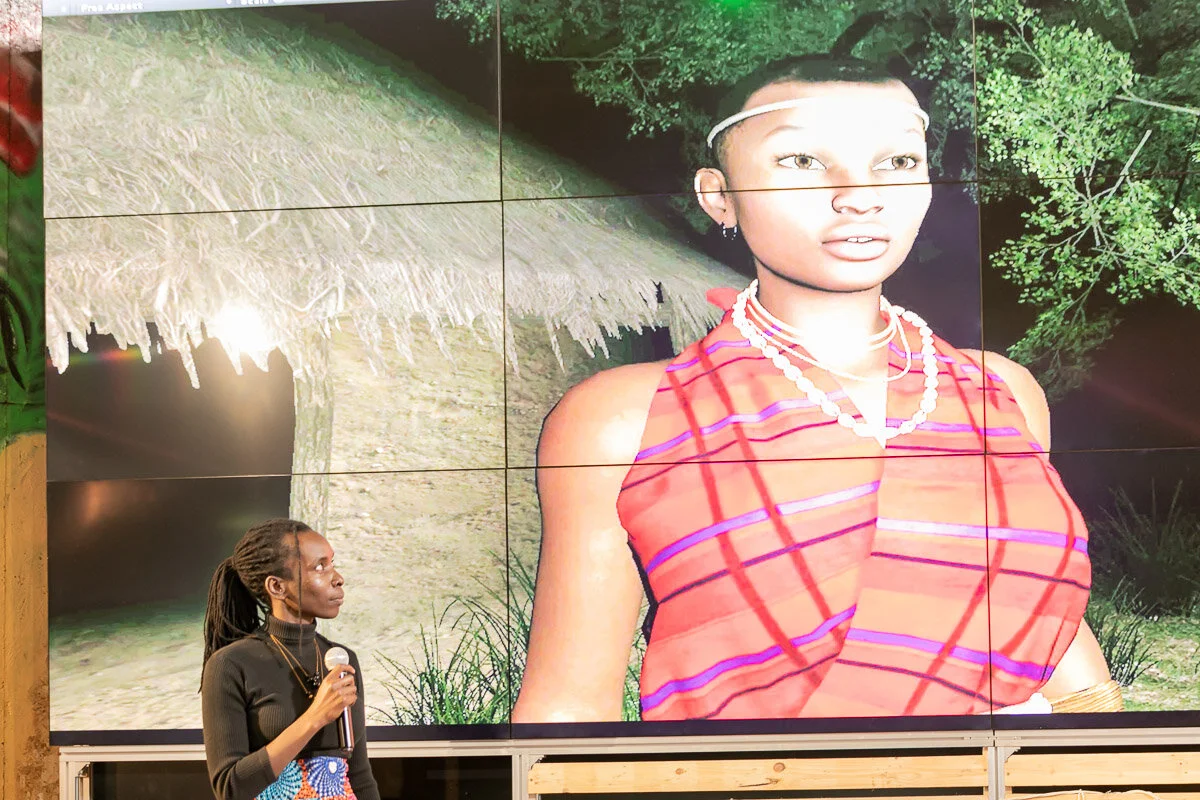The Nairobi Ideas Night 'Works On It'; Presenting Solutions to Local Challenges
Proffesor Bitange Ndemo opening up the stage for Nairobi Ideas Night: Working On It/Next Einstein Forum
Author: Naliaka Odera
“How exciting to be in a space with innovators and change-makers!” Kenyan musician Mayonde exclaimed during her performance at the Nairobi Ideas Night: Working On It edition. Held at the K1 Klub House, the fourth Nairobi Ideas Night was attended by a diverse audience of academics, curious non-academics, university students, young professionals, and retirees, all eager to hear from scientists. Professor Bitange Ndemo, a Professor of Entrepreneurship at the University of Nairobi Business School and Mawazo Institute Board Member set the stage for the six scientists by talking about the intersection of science and business, giving several examples of the changing trends in Kenya. Each of the six change-makers who followed Professor Bitange were all terrific examples of how science can intersect with other industries, including business, health, journalism, and development as they delivered five minutes lightning talks on their work and big ideas for transforming Kenya.
Dr. Eddine Sarroukh, Senior Advisor for Innovation & Technology, SDG Partnership Platform, UN Kenya Resident Coordinator’s Office.
Dr. Eddine Sarroukh brimmed with energy as he spoke of the potential for innovation that exists on the continent and in Kenya specifically. As a Senior Advisor for Innovation and Technology with the SDG Partnership Platform under the United Nations Kenya Resident Coordinator’s Office, Dr. Eddine works with all levels of government, civil society, and institutions to tackle sustainable development goals related to the technical and innovative capacities of countries. As he outlined in his lightning talk, technology has improved problem solving exponentially. He gave the example of 3D printing and what that could mean for building cheaper, and more sustainable, housing for Kenyans. One of the challenges of his work, he explained, is getting policymakers and decision-makers to keep up with the latest technology. In his call to action during the audience Q&A at the end of the evening, he stressed the need for experts to work and collaborate beyond their silos of knowledge. “Our challenges today cannot be found in silos,” Dr. Eddine declared.
Dr. Eddine Sarroukh/Next Einstein Forum
More about Dr. Eddine Sarroukh’s work:
Brand, Reon, Luc de Clerck Simona Rocchi, Bahaa Eddine Sarroukh, and Karthik Subbaraman. “Turning Societal Challenges into Business through Value Sharing”. European Business Review. 10 February 2018.
“The Sustainable Development Goals.” UNDP. 2019.
Samuel Gikandi, CEO, Africa’s Talking Labs.
“Each of us has an inner superstar waiting to reveal themselves,” began Samuel Gikandi, Founder of Africa’s Talking and CEO at AT Labs, an incubator that works will fledgling companies and startups to validate their ideas and provide mentorship, infrastructure, and workspace. Samuel encouraged the audience to consider the value of a single skill like coding and how that can be something that is flamed into a fully-fledged business or career. He asked that people think beyond what has come before and instead look to expand into new skill areas. “If we become intentional and unconventional, we can take advantage of the fourth revolution,” he said.
During the audience Q&A, many were curious to know how Africa’s Talking Labs works to support young people, and with them. Samuel explained that he and the entire team behind Africa’s Talking are aware that exposure to technology and coding can be very classist in Kenya. To mitigate this, Africa’s Talking intentionally gives opportunities and internships that focus less on hands-on experience and instead, more on passion and enthusiasm. Furthermore, Samuel believes that everyone in every generation should be taught coding. “Teaching coding is teaching people a new way of thinking,” he passionately argued. Samuel’s call to action is for everyone to follow their passions and to find their own inner superstar.
Samuel Gikandi/Next Einstein Forum
More about Samuel Gikandi’s work:
“Africa’s Talking CEO Sam Gikandi on Building a Pan-African Tech Company”. YouTube/ Africa Talking. 19 October 2019.
“Episode 016: Samuel Gikandi – The CEO of Africa’s Leading Mobile Solutions Company Africa’s Talking”. YAE Podcast. 25 June 2018.
Marilyn Ronoh, Mawazo Institute Scholar, Part-time Lecturer and PhD Student in Mathematics, University of Nairobi.
Marilyn Ronoh is a 2018 Mawazo Institute Scholar whose use of mathematics to address infectious diseases, specifically HIV/AIDS, in her PhD research has earned her widespread recognition. Marilyn spoke about her work creating a mathematical model that predicted and explored the trends of HIV/AIDS awareness among young people in Kenya. Her model is a cost-effective way to analyse the effectiveness of awareness campaigns among Kenyan youth, which is the demographic that has recently seen an increase in HIV infections. For Marilyn, young people are the future of Kenya and beyond just her research, she consistently finds ways to work with and inspire Kenyan youth. Responding to an audience member’s question about how all the speakers were passing on their knowledge and skills to the next generation, Marilyn shared that she actively mentors High School students. In her final call to action, she urged for more research to be used outside of academic circles. “Research should not just be in libraries,” Marilyn emphasised.
Marilyn Ronoh/Next Einstein Forum
More about Marilyn Ronoh’s work:
Joseph, Natasha, Marilyn Ronoh et al. “ Want to be a woman in science? Here’s advice from those who’ve gone before”. The Conversation. 7 February 2019.
Ronoh, Marily. “Meet Marilyn Ronoh: Reducing HIV/AIDS Risks in Young Kenyans: An Awareness Mathematical Model”. The Mawazo Institute. 8 March 2019.
Dr. David Kimiti, Head of Research and Monitoring, Lewa Wildlife Conservancy.
Dr. David Kimiti is a rangeland ecologist with a sense of humour. His talk, titled “Talk Dirt to Me”, showcased the vast wildlife that Kenya can be proud of, while urging the audience to think beyond the ‘Big 5’ when considering conservation. Dr. David’s work focuses on land potential or the inherent ability for land to sustainably generate ecosystems. The biggest cause of wildlife devastation in Kenya has not been poaching, as many would assume, he says, but instead the loss of ecosystems and land degradation. He stressed that saving the whole ecosystem is a much more effective and necessary way of saving individual species. Further at Lewa Wildlife Conservancy, where he is the Head of Research and Monitoring, they do not accept donations that are species-specific, instead encouraging a focus on the restoration of entire ecosystems. Dr. David believes that educating Kenyans on the importance of conservation and working with rural communities, as Lewa already does, is imperative in changing the wider conversation on conservation. He urged Kenyans to travel the country, educate themselves on local conservation needs, and use that to inform policy action.
Dr. David Kimiti/Next Einstein Forum
More about Dr. David Kimiti’s Work:
“Episode 10: Meet Dr. David Kimiti”. Nairobi Ideas Podcast by The Mawazo Institute. 11 October 2019.
“About Lewa”. Lewa Wildlife Conservancy. 2018.
Moina Spooner, Commissioning Editor, The Conversation Africa.
Moina Spooner is a person who is passionate about Africans telling their own story. Born and raised in Kenya, Moina realised two things in university, firstly that traditional media was dying and secondly, that there needed to be more experts reporting on issues relevant to their field. The not for profit media company, The Conversation, that Moina works for helps ensure that she is contributing both to keeping journalism alive, as well as ensuring that African scientists can impart their knowledge with the world. The Conversation is an international organisation, founded in Australia, that now has offices across Africa, including Nairobi. They have creative commons publishing rights which means that any publication can republish their articles for free and all of their articles are written by academics. In that way, they are an effective tool for connecting academics and their analysis and research with the public. In her call to action, Moina talked about the importance of supporting African academics by reading their work and sharing their stories.
Moina Spooner/Next Einstein Forum
More about Moina Spooner’s Work:
The Conversation. 2019.
Ngware, Moses. “Where Kenya is spending money on education – and what’s missing”. The Conversation. 14 November 2019.
Melisa Allela, Mawazo Institute Scholar, Assistant Lecturer and PhD Student in Animation and Interactive Media Design, Technical University of Kenya.
Melisa Allela, a Mawazo Institute Scholar, is the perfect example of someone working in interdisciplinary fields. As an Assistant Lecturer and PhD student in Amination and Interactive Media Design at the Technical University of Kenya, she had the room’s full attention as she explained how she is bringing virtual storytelling into a Kenyan context. Melisa is intent on making sure that the culturally significant art of oral storytelling is not forgotten in Kenya or the region’s history. She remarked on the difference of seeing African stories written out versus hearing and experiencing them told live; harkening back to storytelling from our childhoodHer project, therefore, attempts to bring together aspects of African oral storytelling like interaction and gestures, and modern devices like virtual reality. Melisa has built a virtual Artificial Intelligence (A.I.) persona garbed in traditional dress to relay the Song of Lawino by Ugandan author Okot p’Bitek. Melisa wowed the crowd with a short demonstration of her AI persona projected on the screen behind her. A buzz of excitement moved through the audience as people began to consider the impact of Melisa’s work on Kenya’s heritage. In her call to action Melisa encouraged Kenyans to seek out Kenyan stories and publications, including those told in varying art forms like comic books, and in that way help keep Kenyan stories alive.
Melisa Allela/Next Einstein Forum
More about Melisa’ Allela’s work:
Allela, Melisa. “Meet Melisa Allela: Re-imagining the Traditional Forms of Storytelling in Africa”. The Mawazo Institute. 24 May 2018.
“Selected Projects for the Cultural Heritage Seed Fund!” HEVA Fund. 12 April 2019.







